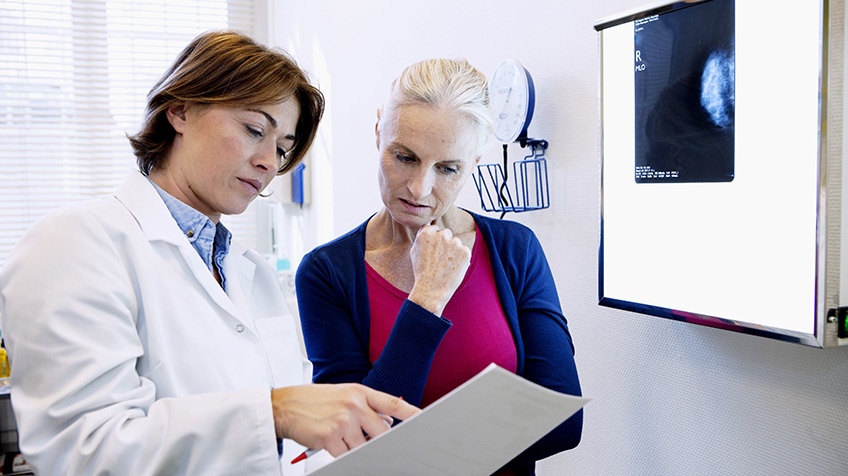
Inflammatory breast cancer is a rare but aggressive form of breast cancer. Accounting for 1% to 5% of all breast cancer diagnoses in the United States, this type of breast cancer forms in the cells that line the breasts’ milk ducts, but quickly spreads to nearby lymph nodes and sometimes other tissues in the body. The cancer is called “inflammatory” because the cancer cells usually block the lymphatic vessels in the breast. This causes fluid to build up, which leads to inflammation that is usually red and tender.
How is Inflammatory Breast Cancer Different than Typical Breast Cancers?Compared to slower-growing forms of breast cancer, inflammatory breast cancer progresses and spreads through the body quickly – sometimes in a matter of months or even weeks.
Inflammatory breast cancer is harder to treat than other breast cancers because it has usually spread to distant parts of the body by the time it is diagnosed. Breast cancer specialists report that compared to other breast cancers, inflammatory breast cancers are usually diagnosed in younger patients. This type of cancer is also more common in African-American women and people who are obese.
Signs and Symptoms of Inflammatory Breast Cancer
Inflammatory breast cancer can be hard to diagnose. Unlike other types of breast cancer that are diagnosed after a lump is discovered in the breast, inflammatory breast cancer often doesn’t cause a breast lump and may not be detected on a mammogram.
The most common symptoms of inflammatory breast cancer are:
- Swelling of the breast
- Redness involving one-third or more of the skin, on or around the breast
- Pitting or ridging of the skin of the breast (texture resembling an orange peel)
- Tenderness or itching of the breast
- Affected breast feels warmer or heavier than your other breast
- Hardening of the breast
- Swollen lymph nodes beneath the arm or near the collarbone
- Inverted nipple (especially if that was not typical for you)
If you have any of the signs or symptoms listed above, that doesn’t mean you have inflammatory breast cancer. The symptoms of more common breast infections are similar to the symptoms of inflammatory breast cancer. However, you should make an appointment with your primary care physician right away for evaluation. Learn more about common signs of breast cancer.
How is Inflammatory Breast Cancer Diagnosed?
If you are exhibiting any symptoms of inflammatory breast cancer, your doctor may first suspect a breast infection and prescribe antibiotics. If your symptoms don’t improve within 7 to 10 days, you should let your doctor know. Inflammatory breast cancer spreads rapidly, so it’s important to follow up as soon as possible. If your primary care doctor suspects you might have breast cancer, he or she will refer you to a breast cancer specialist.
If an oncologist suspects inflammatory breast cancer, he or she will most likely order a biopsy and some form of imaging test (probably a mammogram or an ultrasound).
If cancer is detected, CT scans, lymph node biopsies and bone scans are used to stage the cancer and find out if it has spread to other parts of the body.
How is Inflammatory Breast Cancer Treated?
Treatment for inflammatory breast cancer depends on how advanced the disease is and whether it has certain characteristics, like hormone receptors or specific gene mutations. Breast cancer doctors generally treat inflammatory breast cancer first with chemotherapy, then with surgery to try and remove the tumor, followed by radiation therapy treatment.
If the cancer is HER2-positive, targeted therapy is usually given along with chemotherapy. For hormone receptor-positive cancers, hormone therapy is often added after chemotherapy. If the cancer has a BRCA gene mutation, a targeted drug called a PARP inhibitor may be used. Immunotherapy might also be included in the treatment plan if the cancer produces a protein called PD-L1.
This multimodality approach has been shown to be the most effective treatment of inflammatory breast cancer.
Personalized Breast Cancer Treatment Plans at Virginia Oncology Associates
If you or a loved one has been diagnosed with inflammatory breast cancer – or any type of breast cancer – you undoubtedly have many questions. If you are researching your options for breast cancer treatment in the Hampton Roads region, we encourage you to contact us at Virginia Oncology Associates. We offer convenient locations in Chesapeake, Elizabeth City, Hampton, Newport News, Norfolk, Suffolk, Virginia Beach, and Williamsburg.
Originally published 7/19, Updated 10/19





